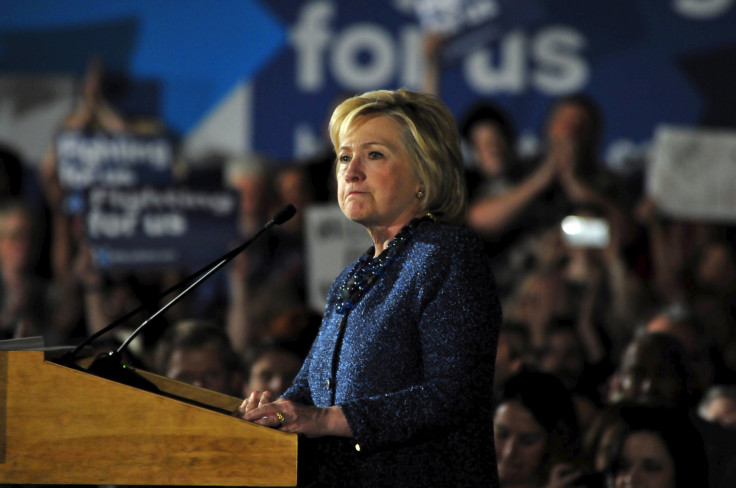Hillary Clinton Denounces Corporate Crime While Accepting Cash From Blackstone, Firm Sanctioned By SEC

Hillary Clinton is traveling the country, promising to get tough on corporate wrongdoers and “shadow banks.” But as she promises to crack down on investment firms that offer banking services outside the purview of traditional financial regulations, her presidential campaign is vacuuming in cash from executives at a Wall Street firm known as one of the country’s biggest shadow banks — one recently fined by federal regulators for allegedly ripping off its clients.
Last week, the president of Blackstone Group, Tony James, hosted a fundraiser for Clinton. The cash flowed to the Clinton campaign just two months after the private-equity giant settled with the Securities and Exchange Commission over charges that it used so-called monitoring fees to enrich the firm at the expense of investors. Clinton accepted the money from executives at the sanctioned firm even as she has criticized the Obama administration for not punishing the perpetrators of financial crime more strenuously.
Among the investors in the Blackstone funds harmed by the scheme were major public pension systems in California, Florida and New Jersey, which hold the retirement savings of teachers, police officers, firefighters and other government workers. In all, municipal and state pension systems have committed at least $9.7 billion worth of investments in the three Blackstone funds the SEC says were hit, according to the research firm Preqin. (A top Blackstone executive said in 2010 that public employees enjoyed retirement benefits that are “too generous.”) Clinton has been endorsed by a number of major unions that represent public employees who rely on public pension systems for their retirement.
Spokespeople for Clinton and Blackstone did not respond to International Business Times questions about its executives’ support for Clinton or the SEC case.
Clinton has ties to some of the key players in the Blackstone entities targeted by the SEC. One of the specific Blackstone investment funds involved in the scheme, SEC documents say, was run by executives James and Laurence Tosi. Just two weeks after the SEC settlement, James — a high-profile defender of shadow banking — touted his support for Clinton.
Two months later, as Clinton continued to portray herself as a crusader against corporate crime, James headlined a $33,000-a-person fundraiser for her campaign at his home, according to the Wall Street Journal. James is expected to host another such fundraiser early in 2016, the paper reported.
In the past, James has been a featured attendee and participant at events hosted by the Clinton family foundation. Both James and Tosi have made maximum contributions to Clinton’s presidential campaign — two of more than a dozen executives who had previously deposited a combined $44,000 in her campaign treasury. During her previous Senate and presidential runs, Clinton was one of the top recipients of campaign cash from firms classified by the nonpartisan Center for Responsive Politics as “private-equity and investment firms.”
Dennis Kelleher, president and CEO of Better Markets, which advocates for tougher regulation on Wall Street, told IBT that such campaign contributions reflect the financial industry’s desire to have government influence if Clinton is elected president.
“Clinton has said the shadow banking system needs more regulation — which private-equity and hedge funds are at the core of,” he said. “So to some extent, this is the standard D.C. playbook: Anytime candidates start focusing on something, the industries that could be affected quickly line up to give money to any policymaker who might be engaged in the issue, so that they can at least have a seat at the table.”
As a one of the biggest players in both shadow banking and private-equity investments, Blackstone has a significant interest in the outcome of the presidential election. The next president could play a role in proposals to either strengthen or weaken disclosure requirements and will have a say in whether the SEC continues or suspends its new scrutiny of the private-equity industry’s use of fees to extract value from unsuspecting investors’ assets.
Such fees were at the heart of the SEC’s settlement with the Blackstone funds. According to the SEC, Blackstone sped up the fees it charges to the underlying companies in its customers’ portfolios, hurting investors by reducing those companies’ value. The SEC also said that while Blackstone negotiated a reduced rate for legal fees for itself, it did not extend the discount to its investors. Blackstone settled “without admitting or denying the findings,” the SEC’s order says.
“The SEC fines seem like less than a slap on the wrist for one of the biggest companies in an industry that has been gouging pensions,” pension consultant Chris Tobe said. “Blackstone has 20 different ways that it siphons fees from investors — this is just one of them, and the regulators barely punished them.” A new study by Oxford University researchers concluded that private-equity firms have charged $20 billion in hidden fees over the past two decades.
Clinton is not the only 2016 candidate benefiting from Blackstone’s interest in the outcome of financial regulatory policies and enforcement decisions. A super PAC created by former Florida Gov. Jeb Bush received $100,000 from Blackstone’s CEO, Stephen Schwarzman, who is listed as an officer for one of the funds included in the SEC settlement.
In 2006, Bush’s administration started the state of Florida’s investment in one of the Blackstone funds scrutinized by the SEC. Florida has paid Blackstone at least $5.8 million in fees on the deal, according to data provided to IBT by state pension officials.
© Copyright IBTimes 2025. All rights reserved.






















